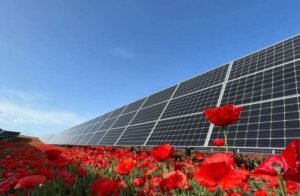Energy storage last resort for European transformation?

Europe’s energy future is in doubt. Experts gathered in Munich during the ESS Experience Day agreed: without investment in energy storage and modernization of transmission networks, the energy transition may be stuck.
The sun is shining, the electricity is gone
On a sunny spring day, Chinese manufacturer Sungrow organized an industry meeting to which more than 300 participants from all over Europe were invited. The main theme of the event was the challenges of the next phase of the energy transition on the continent.
The panelists agreed that the further development of renewable energy sources is pointless without adequate storage facilities. “Without storage, electricity cannot be used efficiently –” warned Starry Ge, an analyst at Rho Motion. She added that in the UK, half of renewable energy is wasted because of transmission restrictions, which translates into higher electricity prices for consumers.
The network can’t keep up with the market
One of the most pressing problems discussed during the conference was the long delays in connecting installations to the network. “In Germany, the average project takes five to six years from concept to launch,” said Florian Diehm, product and supply chain director at Kyon Energy. According to him, the development of the network clearly differs from the dynamics of investments in res.
Diehm did not hide his frustration and sent a clear message to politicians: “we can no longer justify ourselves with German bureaucracy. We need clear political will and programmes to accelerate infrastructure development.
Poland is betting on warehouses, but this is only the beginning
Poland, although still on track in the field of RES, can boast of concrete steps. Adam Zalewski, vice president of strategy and development at Griffin Group Energy, said that energy storage has been included in the capacity market. Currently, there are eight support programs and auction markets dedicated to warehouses.
We have 3 GW projects in the plans and construction-Zalewski said. He explained that the coal-fired power plants need to be replaced quickly. First it was put on res, now it becomes necessary to supplement them with storage systems. However, even with the growing involvement of network operators, in his opinion, it will take several years for the systems to actually enter into operation. “Renewable energy sources can be treated like real power plants only if they are combined with storage,” he said.
Europe in the lead, Australia in the lead
Starry Ge noted that Europe performs very poorly against the background of other regions. Rho Motion monitors ok. 3000 storage projects in the world. According to the analyst, Europe has by far the longest processes of all regions. In Australia, the construction and commissioning of the warehouse takes only six months, because the law treats such installations as critical to energy security.
In the Old Continent, long administrative procedures and a lack of coherent policy are obstacles. Experts have no doubt that legislative changes are needed to give priority to investments in warehouses.
Business without simple solutions
Lars Löhle, commercial director at Entrix, argued that the flexibility of the energy system requires support from warehouses, and this type of equipment is not an option, but a necessity. “We need a high level of flexibility in the energy system. Warehouses can provide this-efficiently, controllably and within a cost-effective business model, ” said Löhle. At the same time, he noted that entering this market requires knowledge of complex revenue models. “You move between the next day market, the intraday market and the balancing market, and you have to find a strategy that determines how much risk you are willing to take,” he explained.
Stefan Zhao of Sungrow Europe called for a choice of technologies that will be long-lasting or easy to upgrade: “who wants to invest today, must choose solutions that will be profitable in 20 years or can be adapted. He also pointed to the potential of sodium-ion batteries, which, although currently more expensive, can provide an advantage in terms of availability of materials and Eco-Solutions.
Time for real action
Both industry and market experts agreed: without storage, stable prices, reliable supplies and efficient use of green energy cannot be expected. Europe must accelerate and create a friendly legal environment for these investments. “Renewable energy sources can be considered as serious power plants only if they are combined with storage facilities –” Adam Zalewski from Griffin Group Energy recalled at the end of the discussion.




